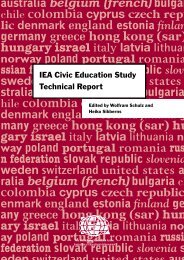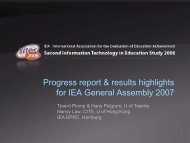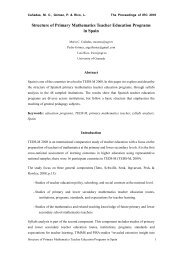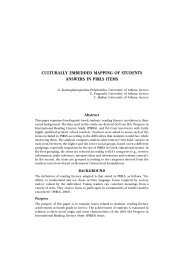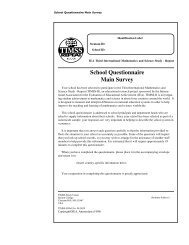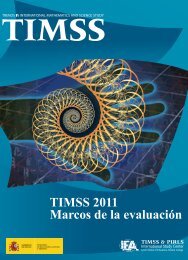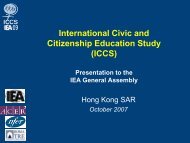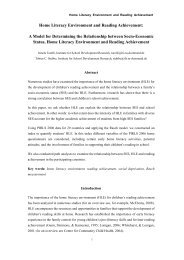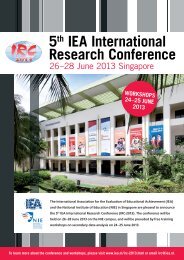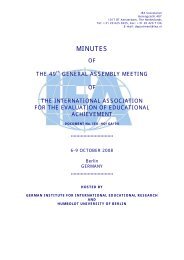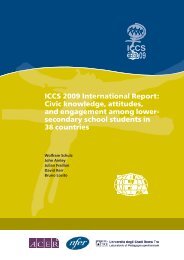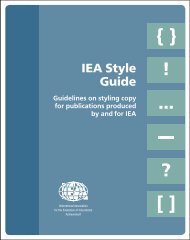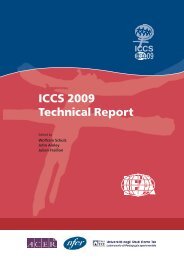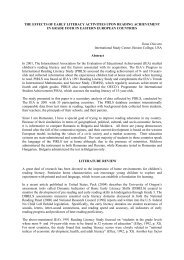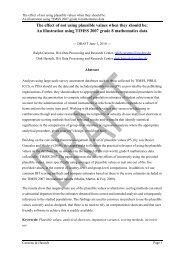International civic and citizenship education study - iccs - IEA
International civic and citizenship education study - iccs - IEA
International civic and citizenship education study - iccs - IEA
- TAGS
- civic
- citizenship
- iccs
- www.iea.nl
You also want an ePaper? Increase the reach of your titles
YUMPU automatically turns print PDFs into web optimized ePapers that Google loves.
School characteristics <strong>and</strong> resources: School resources consist of both material <strong>and</strong> human resources,<br />
<strong>and</strong> there is strong debate on the extent to which school resources can contribute to school<br />
development <strong>and</strong> improvement (Hanushek, 1994, 1997). Beyond the quality of teachers, there<br />
is evidence that teacher density—as measured by the students to teacher ratio—is associated<br />
with some student outcomes (McNeal, 1997).<br />
The ICCS school questionnaire includes items asking about the demographic characteristics<br />
of schools (Anderson, Ryan, & Shapiro, 1989). These characteristics are associated with the<br />
variables usually included in a description of a school. The questionnaire also includes a few<br />
questions asking for fundamental information, notably the type of school (public/private),<br />
students’ enrolment, <strong>and</strong> number of teachers.<br />
School management: Schools differ within <strong>and</strong> across countries with reference to the degree<br />
of autonomy in defining their own <strong>education</strong>al policies in terms of their management in<br />
the narrowest sense (school governance, financing, teaching <strong>and</strong> non-teaching staff ) <strong>and</strong><br />
their organization of curricular <strong>and</strong> teaching <strong>and</strong> learning activities (curricular contents,<br />
cross-curricular activities, choice of textbooks, assessment <strong>and</strong> evaluation) (Eurydice, 2007).<br />
Individual schools’ degree of autonomy is a factor affecting the possibility of establishing<br />
specific courses <strong>and</strong> activities (both curricular <strong>and</strong> extra-curricular ones) linked to <strong>civic</strong> <strong>and</strong><br />
<strong>citizenship</strong> <strong>education</strong>. A broader degree of autonomy can give greater opportunities for<br />
the effective participation within democratic school governance of not only teachers <strong>and</strong><br />
students but also of administrative staff, parents, <strong>and</strong> the community as a whole. The school<br />
improvement literature shows that at least some autonomy favors the success of improvement<br />
efforts (Reezigt & Creemers, 2005).<br />
The questions included in the school questionnaire investigate the level of schools’ autonomy<br />
in management <strong>and</strong> in <strong>education</strong>al planning. Opportunity to organize specific courses,<br />
projects, curricular <strong>and</strong> extra-curricular activities, to choose textbooks, <strong>and</strong> to define criteria<br />
<strong>and</strong> procedures for assessment, evaluation, <strong>and</strong> self-evaluation all contribute to characterizing<br />
the school <strong>education</strong>al plan as one that is more or less consistent with the development of<br />
effective <strong>civic</strong> <strong>and</strong> <strong>citizenship</strong> <strong>education</strong>. Furthermore, the existence of national legislation <strong>and</strong><br />
regulations <strong>and</strong> of st<strong>and</strong>ards concerning the results that students should achieve, can act, within<br />
different school systems, as a resource or a constraint for the development of activities related to<br />
<strong>civic</strong> <strong>and</strong> <strong>citizenship</strong> <strong>education</strong>.<br />
The principals’ answers to the questionnaire items also give insight into the extent to which a<br />
school has autonomy to determine its own <strong>education</strong>al planning <strong>and</strong> <strong>education</strong>al activities <strong>and</strong><br />
how these relate to the construction of an open <strong>and</strong> democratic school culture. These responses<br />
furthermore show the extent to which the organization of decisionmaking processes influences<br />
the participation of teachers, parents, <strong>and</strong> students in the running of the school.<br />
Teacher, parent, <strong>and</strong> student participation at school: Participative governance practices help<br />
characterize schools as democratic learning environments. Allowing for the participation of<br />
teachers <strong>and</strong> parents assists each school to underst<strong>and</strong> the variety of student learning needs<br />
<strong>and</strong> to secure teachers’ <strong>and</strong> parents’ commitment to supporting school <strong>education</strong>al activities<br />
(Ranson, Farrell, Peim, & Smith, 2005).<br />
Students’ participation in the running of the school helps to build a democratic school<br />
environment <strong>and</strong> to give students opportunity to develop skills <strong>and</strong> attitudes related to <strong>civic</strong><br />
<strong>and</strong> <strong>citizenship</strong> <strong>education</strong>. CIVED showed that students’ participation in school councils <strong>and</strong><br />
student parliaments related positively to students’ <strong>civic</strong> knowledge <strong>and</strong> engagement (Losito &<br />
D’Apice, 2003; Torney-Purta et al., 2001).<br />
ICCS ASSeSSment FrAmework<br />
37



